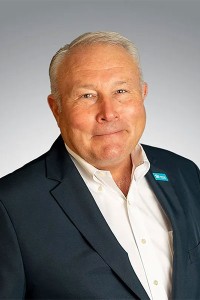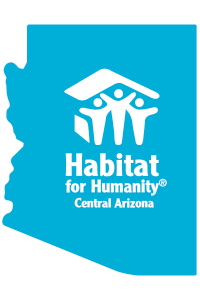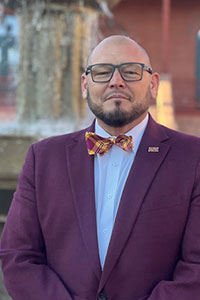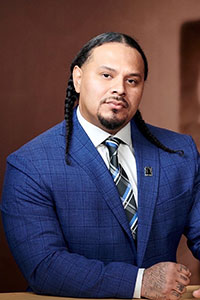2025 Honorees
Habitat for Humanity Central Arizona
ASU MLK Community Servant-Leadership Award recipient


Accepting this award on behalf of Habitat for Humanity Central Arizona is Jason Barlow, president and CEO.
Habitat for Humanity Central Arizona is a local charity that renovates and repairs homes for eligible families. With renting, buying, and repairing homes being expensive propositions, many Arizona families are struggling to make ends meet and often forced to choose between essentials such as groceries, rent, healthcare, and transportation.
Habitat for Humanity Central Arizona aims to help seniors, veterans, and single parents in need of affordable housing and works toward building a stronger community through programs such as home repairs, neighborhood revitalization, aging in place, veteran services, construction training, and the Habitat ReStores. HHCA believes in giving everyone a decent, affordable place to call home in Phoenix, Tempe, Glendale, Peoria and all of Maricopa County.
Since 1985, Habitat for Humanity has built over 1,200 homes, completed more than 3,800 repairs, and improved living conditions for more than 5,000 Arizona families, all thanks to the generosity of donors and volunteers.
Good morning, Ladies and Gentlemen – It is such an honor to be here. I am grateful to be sharing this space with each of you today.
This morning, I am grateful for a space called ASU and its drive toward innovation and inclusivity.
I’m grateful for a space called Arizona. Home to so much beauty and diversity – such dramatic landscapes can be found here. From the lofty mountains up north beyond the Mogollon Rim – to the low-lying deserts stretching to the Baja. A state that enjoys some 350 days of blue skies and sunshine and populated with people from almost everywhere – now calling Arizona home.
I am grateful for a space called Habitat for Humanity. Our work seeks to put God’s love into action by bringing people together to build homes, communities and hope. We are privileged in this work to serve alongside families who are not looking for a handout, but a hand up – and willing to build their own homes with our help – who does that anymore? Since 1985 Habitat Central Arizona has been able to improve the living and housing situation for more than 5000 Arizona families. Now we recognize that building and repairing homes with an army of volunteers with little construction experience is not the most efficient way of going about it – in fact we think there are 3 times as many nails in a Habitat home as are necessary….but we truly embrace this part of our mission – Bringing people together. It’s the most important part of the work we do – and again, we are grateful.
We’re grateful to the more than 10,000 volunteers, sponsors and donors who not only support our work, but share in the space with us by coming out to do the work with us every year – sometimes even in June and July – to shingle a roof for a single parent, replace a water heater for a veteran hero, put in new flooring for an elderly woman, landscape a yard or simply paint a home. At Habitat we believe that nothing activates spaces quite like three bedrooms and two baths.
Most importantly, we are grateful for a space called home. A space which by its very definition means – belonging. A space where families can grow, thrive, and build memories together. A space to do homework. A space to share home-cooked meals. A space to rest and think. It’s a space where we all belong. And that’s what we aim to do at Habitat for Humanity Central Arizona – to create spaces that families can call their own, where they can put down roots, and where they can belong. Last October we kicked off a new twenty-five home development in South Phoenix called Alta Vista Ranch. When it’s all said and done, it will be home to about 75 children, who will be twice as likely to go to college, less likely to be in trouble with the law, and healthier.
Today we celebrate the legacy of Dr. Martin Luther King Jr. His message of service, justice, and equality for all continues to inspire us today. Dr. King once said, “Everyone can be great because anybody can serve. You do not have to have a college degree to serve. You do not have to make your subject and verb agree to serve. You only need a heart full of grace. A soul generated by love.” This quote embodies the spirit of Habitat for Humanity Central Arizona. We believe that everyone can make a difference in the world, and it starts with the simple act of service.
It is an incredible honor to be recognized as the ASU Dr. Martin Luther King Jr. Servant-Leadership Awardee for 2025. We accept this award on behalf of our staff, volunteers, sponsors, and community partners who have worked tirelessly to build homes and hope for families in need of affordable housing. We are humbled and inspired by this recognition, and we promise to continue our work toward building a world where everyone has a safe, decent and affordable place to call home.
We invite you to join us in creating spaces where everyone belongs. A space where every family has a roof over their heads, where kids can play, learn and grow, and where communities can come together to support one another. Together, we CAN and we WILL give Arizona a Hand Up.”
Charles St. Clair
ASU MLK Faculty Servant-Leadership Award recipient

Charles St. Clair is an Emmy-Award winning professor of practice on the faculty of Arizona State University West Valley where he teaches acting and directing and serves as the technical director for the School of Humanities, Arts and Cultural Studies, (SHArCS) in the New College of Interdisciplinary Arts and Sciences.
In 1991, when many Arizonans wanted to officially adopt a Martin Luther King, Jr. holiday after a governor had controversially rescinded it, Charles St. Clair and a few other faculty members gathered a group together to listen to Charles deliver MLK’s stirring “I Have a Dream” speech in its entirety right next to a reflecting pool on the campus of ASU West Valley in Phoenix. Since then, hundreds and then thousands of middle school students, ASU students and community members have gathered on campus every January to learn about the Civil Rights movement and re-enact the famous March on Washington at the free event called MLK March on West.
Charles’ devotion and commitment to teaching students about the importance of racial equality drives much of what he does. For decades he also served as a leader on the Black History Month Committee at ASU West Valley. Charles has served as an advisor for the ASU Black Student Union guiding their efforts. He encourages ASU students to create, volunteer and participate in Black History Month as well as take part in the tradition of the MLK March on West.
Charles has produced and directed many plays and productions celebrating the Black and African experience. He has also curated art exhibits at ASU West Valley featuring local Black artists. Charles is a three-time recipient of the Fulbright-Hays Group Project Abroad grant for cultural study in Ghana, West Africa and hosts study abroad trips with ASU students. In addition, he is a five time Arizona award-winning director.
In the nearly 30 years of driving the tradition of the MLK March on West, Charles has touched the lives of 20,000+ school children, teaching them about civil rights history and the importance of judging people “not by the color of their skin, but by the content of their character.” It’s a message that more than 60 years after Dr. Martin Luther King, Jr. spoke those famous words, are more relevant than ever.
Shawn Banzhaf
ASU MLK Staff Servant-Leadership Award recipient

As the executive director of the Pat Tillman Veterans Center since 2022, Shawn Banzhaf leads, directs and inspires a department within Academic Enterprise Enrollment at Arizona State University. His team of 20 staff and over 70 VA work-study employees provide services to over 18,000 military connected learners attending the university.
Banzhaf served the United States in the Army National Guard for 21 years. He retired as the acting First Sergeant of the 1057th Transportation Company. He is an Iraq War Veteran, during which he earned the Bronze Star and Combat Action Badge during 100 combat missions in and around Baghdad, Ramadi and Fallujah. His unit, the 1074th Transportation Company, was awarded the Meritorious Unit Citation during their yearlong campaign.
Banzhaf is the creator and author of the “5 Ls: A Practical Guide for Helping Loved Ones Heal After Trauma”. He has trained thousands of individuals on how using this method is a tool anyone can use with a loved one struggling with PTSD, whether veteran or not.
Perhaps, we have faced these apparent catastrophic feelings before, but never have they felt so close to us personally. Collectively we spend our days doom scrolling causing us to capitulate to the attention mongers. What if instead you and began to write or speak the opposite of doom. What if scrolling became time for strolling and dreaming of the better or bester version of our society. What if instead of hate we chose love. This thing, this love I speak of is phielo love, or brotherly or sisterly love. Could be that simply deciding to give a damn about one another could be the thing that changes doom into hope? I am not naïve enough to think that just saying certain things changes them overnight, but the act of doing them on a consistent basis has merit. Love is not just a word though we have thrown it around all willy-nilly. I love cheeseburgers, I love pizza, I loved that movie. Love has depth and consequence. Love is risky. Love is given and love is received.
Servant leadership is about love and about the selflessness in pursuit of making others know they are loved. Today I stand before you the benefactor of that selflessness. My family, friends and colleagues have it par of their life’s priorities to make me feel loved. Many of them are here with me today. I would like to thank them and everyone else for their support.
Now do me a favor and participate with me here a moment. Please take out your pointy finger. Point to yourself and repeat after me. I DESERVE TO BE LOVED.
Yes, you do and if no has told you yet today. I love you.
There is a sage wisdom that I think Dr. King would be happy I spoke and it this. Perfect love cast out all fear. If you and I are afraid, we should love.
And as Dr. King is so often quoted, I hope to give you a quote today from me that you will remember.
There is no such thing as a Love Crime. So, go out and commit to spreading love for you, for me and for our future generations.
Thank you.
Cordero Holmes
ASU MLK Student Servant-Leadership Award recipient

Cordero Holmes is a Phoenix native, a proud member of the Tohono O’odham Nation, and a committed community leader who has made significant contributions to his college and community. His journey is a testament to resilience and growth, having overcome a decade of incarceration to become an advocate for justice-involved youth and a champion of racial equity. Cordero’s educational path began while he was incarcerated, where he enrolled at Rio Salado College. He earned multiple degrees, including certifications in Addiction & Substance Use Disorders, an Associate in Applied Science, and an Associate in the Arts with an emphasis in Psychology. His academic achievements were marked by prestigious awards such as the Phi Theta Kappa Hites Transfer Scholarship, Coca-Cola National Scholar, and Jack Kent Cooke Scholarship.
After his time at Rio Salado, Cordero continued his education at Arizona State University (ASU), where he earned a Bachelor’s degree in Public Service and Public Policy, and is currently pursuing dual master’s degrees in Criminology and Criminal Justice and Public Administration.
As the Director of Operations for Progress Pushers Arizona, Cordero mentors and trains youth aged 12-24 who have been impacted by the justice system. He also serves as a mentor at the Durango Juvenile Detention Center and regularly volunteers with the unhoused population. In addition, Cordero speaks at national events and serves as a STAR Fellow for the Urban Institute, traveling to various tribal nations to facilitate caretaker groups and share his experiences as a parent navigating higher education.
Cordero’s advocacy extends to education policy, where he has worked with the Arizona Department of Education’s Indian Education Advisory Council, advising the state’s Superintendent of Education on policies impacting Indigenous children. He has also partnered with the Computing Alliance for Hispanic Serving Institutions and served on the Maricopa Council on Black American Affairs.
Cordero continues to inspire others with his story of perseverance, advocacy, and his unwavering commitment to making a lasting impact in the lives of others.
Introduction (in O’odham)
Good morning, everyone. My name is Cordero “Ba’ag” Holmes, I am from the Hickwan District in the Tohono O’odham Nation.
It is a deep honor to be here with you all today.
I want to begin by thanking ASU’s Royalty Court, Rio Salado College President Dr. Kate Smith, and all friends and supporters at the Maricopa Community College District. I also want to extend my heartfelt gratitude to Dr. Monica Gaughn for the nomination, and all the schools at Watts College of Public Service and Community Solutions, and to Erika and Diana from Decarcerate Arizona for their tireless commitment to justice.
I also want to thank the Education Transition Specialist from the office of the Maricopa County Superintendent’s Office, Arizona State University, and Coy Graham of Progress Pushers AZ for your friendship, collaboration, and vision. Most importantly, I thank the community, the youth, and the families we serve, who remind us every day why what we do matters.
Today’s theme,”spaces we belong,” invites us to reflect on what it means to feel at home—not only in a physical sense, but in the spaces where we live our truths, dream freely, and build futures of hope and opportunity.
Belonging isn’t just about inclusion; it’s about value. It’s about being seen, heard, and celebrated for who you are, even when the world tries to say otherwise. And for so many of us—whether we’re youth navigating systems that weren’t designed for us, educators working to transform those systems, or advocates fighting to create equitable opportunities—belonging is often a journey.
For many in my community, the reality is displacement. Some are pushed out of classrooms and into courtrooms. Others are navigating the foster care system, incarceration, or cycles of poverty. For us, belonging is not guaranteed. The spaces that should nurture and protect them—like schools, communities, and homes—can sometimes feel unwelcoming, unjust, or unsafe.
But here’s what we know: when we create spaces of belonging, we create spaces of transformation. Spaces where young people feel they have a future worth fighting for. Spaces where second chances are possible. And spaces where we recognize that the path forward requires not just policy changes, but a deep commitment to one another.
This is why the work of Progress Pushers AZ, and so many others in this room is so critical. Together, we are not just imagining better spaces—we’re building them.
I’ve seen firsthand the power of mentorship, education, and community support in my own life and in the lives of the youth we serve. One story that stays with me is that of Luis Vences, who we met in Durango two years ago. Luis was charged and sentenced as an adult, written off by a system that so often fails to see the potential in our young people. But today, Luis is rewriting his story.
Now a student at Phoenix College, he has stepped into his power and he recently moved into his own apartment. As remarkable as his journey has been, Luis is only beginning. His future is bright because he has access to spaces that support and empower him, spaces where his potential is recognized, and his voice is heard.
So, how do we ensure that the spaces we create are spaces of belonging? It starts with us. With asking hard questions about who is being left out and why. With showing up—not just when it’s easy, but when it’s hard. And committing to dismantling the barriers that keep people from accessing the education, justice, and opportunities they deserve.
Belonging is a shared responsibility. It’s on all of us to cultivate spaces where everyone—regardless of their background or story—has the chance to thrive.
As I look around this room, I see leaders, advocates, and changemakers who understand the power of belonging. Together, we can reimagine the spaces we live, work, and grow in. Together, we can create spaces where every voice matters, every story is valued, and every person feels they belong.
I am up here accepting this, but this is OURS. I want thank you all for the work you do, for the spaces you create, and for allowing me to be part of this incredible community. Let’s continue to push for progress and build a world where belonging is not just an aspiration or a DREAM, but a reality for everyone.
